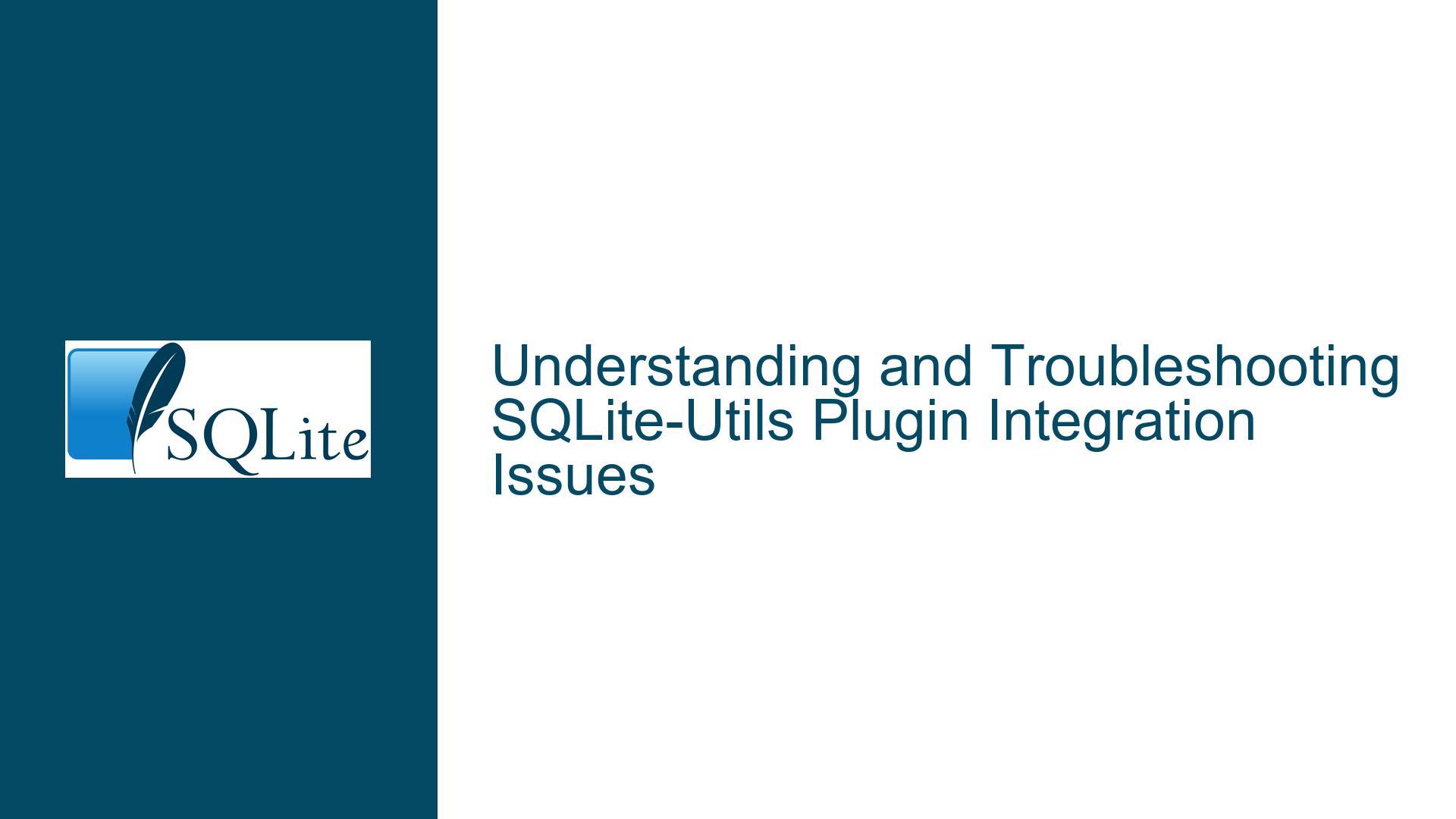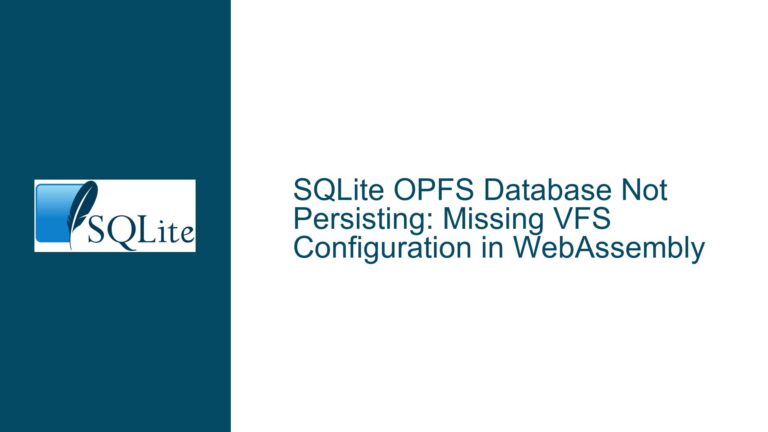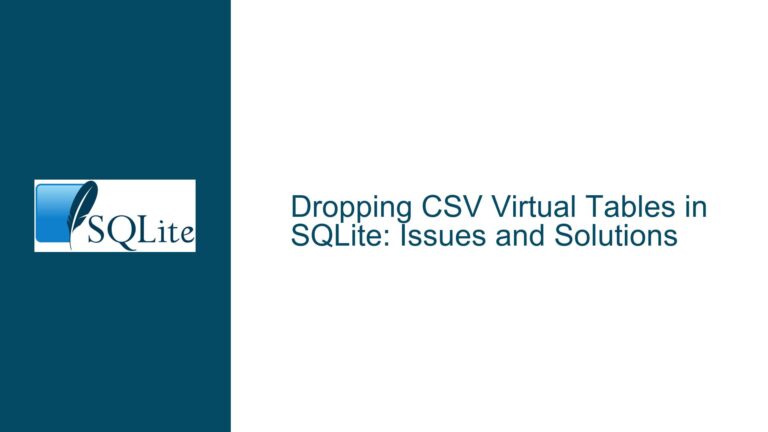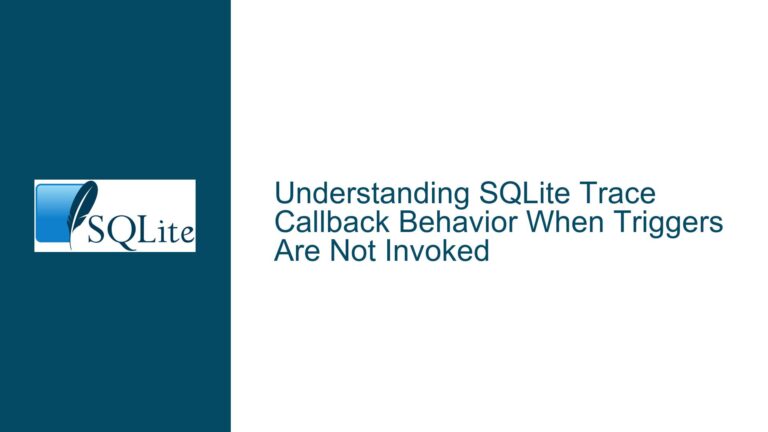and Troubleshooting SQLite-Utils Plugin Integration Issues
Issue Overview: SQLite-Utils Plugin Integration Challenges
SQLite-Utils is a powerful Python library and CLI tool designed to simplify the manipulation of SQLite databases. With the recent addition of plugin support, developers can extend its functionality by adding custom CLI commands and SQL functions. However, integrating plugins into SQLite-Utils can present several challenges, particularly for those unfamiliar with the tool’s architecture or Python’s plugin ecosystem. This section will delve into the core issues that developers might face when working with SQLite-Utils plugins, including compatibility problems, installation hurdles, and runtime errors.
One of the primary issues developers encounter is ensuring that their plugins are correctly recognized and loaded by SQLite-Utils. This involves understanding the plugin registration process, which requires plugins to adhere to specific naming conventions and directory structures. Additionally, plugins must be compatible with the version of SQLite-Utils being used, as changes in the library’s API can lead to incompatibilities. Another common problem is the misconfiguration of environment variables or Python paths, which can prevent SQLite-Utils from locating and loading the plugins.
Developers may also face challenges related to the execution of custom SQL functions registered by plugins. These functions must be correctly implemented to avoid runtime errors, such as type mismatches or incorrect argument handling. Furthermore, the interaction between plugins and the core SQLite-Utils functionality can sometimes lead to unexpected behavior, particularly if plugins modify database schemas or alter table structures in ways that conflict with existing operations.
Possible Causes: Why SQLite-Utils Plugins Fail to Load or Function Correctly
The failure of SQLite-Utils plugins to load or function correctly can be attributed to several underlying causes. One of the most common issues is the incorrect implementation of the plugin interface. SQLite-Utils requires plugins to follow a specific structure, including the definition of a register function that the library can call to register custom commands or SQL functions. If this function is missing or improperly defined, the plugin will not be recognized.
Another potential cause is the misplacement of plugin files. SQLite-Utils expects plugins to be located in specific directories, such as the ~/.sqlite-utils/plugins folder or within the Python path. If plugins are placed in the wrong directory or if the Python path is not correctly configured, SQLite-Utils will be unable to locate and load them. Additionally, issues can arise from conflicts between plugin names and existing SQLite-Utils commands or functions, leading to unexpected behavior or errors.
Version incompatibility is another significant factor. Plugins developed for an older version of SQLite-Utils may not work correctly with newer versions due to changes in the library’s API or internal logic. Similarly, plugins that rely on external dependencies may fail if those dependencies are not installed or are incompatible with the current environment. This is particularly problematic in environments where multiple versions of Python or SQLite-Utils are installed, leading to conflicts that can prevent plugins from functioning as intended.
Runtime errors can also stem from the improper implementation of custom SQL functions. These functions must handle input and output types correctly, and any deviation from the expected behavior can result in errors during execution. For example, a custom function that expects a string input but receives an integer may raise a type error, causing the entire operation to fail. Additionally, plugins that modify database schemas or table structures must do so in a way that is compatible with SQLite’s constraints and the existing schema, or they risk causing corruption or data loss.
Troubleshooting Steps, Solutions & Fixes: Resolving SQLite-Utils Plugin Issues
To address the challenges associated with SQLite-Utils plugins, developers can follow a series of troubleshooting steps and implement solutions to ensure that their plugins load and function correctly. The first step is to verify that the plugin adheres to the required structure and implements the register function correctly. This function should be defined in the plugin’s main module and should register any custom commands or SQL functions with SQLite-Utils. Developers can refer to the SQLite-Utils documentation for examples of correctly implemented plugins.
Next, developers should ensure that the plugin is placed in the correct directory. SQLite-Utils looks for plugins in the ~/.sqlite-utils/plugins folder by default, but this can be overridden by setting the SQLITE_UTILS_PLUGINS_DIR environment variable. If the plugin is not located in the expected directory, SQLite-Utils will not be able to load it. Additionally, developers should verify that the Python path is correctly configured to include the directory containing the plugin, especially if the plugin is installed in a non-standard location.
Version compatibility is another critical aspect to consider. Developers should ensure that their plugins are compatible with the version of SQLite-Utils they are using. This may involve updating the plugin to work with the latest API changes or specifying version constraints in the plugin’s dependencies. If the plugin relies on external libraries, developers should ensure that these dependencies are installed and compatible with the current environment. Using virtual environments can help isolate dependencies and prevent conflicts between different versions of Python or SQLite-Utils.
To address runtime errors related to custom SQL functions, developers should thoroughly test their functions to ensure they handle input and output types correctly. This includes writing unit tests that cover various edge cases and input scenarios. If a function raises an error, developers should examine the error message and traceback to identify the root cause. Common issues include type mismatches, incorrect argument handling, and improper use of SQLite’s API. Developers should also ensure that their functions are thread-safe, as SQLite-Utils may execute them concurrently in multi-threaded environments.
Finally, developers should be cautious when modifying database schemas or table structures through plugins. These operations should be performed in a way that is compatible with SQLite’s constraints and the existing schema. For example, when adding or modifying columns, developers should ensure that the new schema does not conflict with existing indexes or constraints. It may also be necessary to handle data migration carefully to avoid data loss or corruption. Developers can use SQLite’s ALTER TABLE command with caution, as it has limitations compared to other database systems. In some cases, it may be necessary to create a new table with the desired schema and copy data from the old table, then drop the old table and rename the new one.
In conclusion, while SQLite-Utils plugins offer a powerful way to extend the functionality of the library, they can present several challenges that require careful attention to detail. By following the troubleshooting steps and solutions outlined above, developers can ensure that their plugins are correctly integrated and function as intended, allowing them to take full advantage of the capabilities offered by SQLite-Utils.






